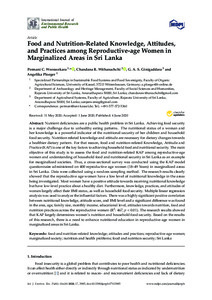| dc.date.accessioned | 2020-07-01T06:55:00Z | |
| dc.date.available | 2020-07-01T06:55:00Z | |
| dc.date.issued | 2020-06-04 | |
| dc.identifier | doi:10.17170/kobra-202007011387 | |
| dc.identifier.uri | http://hdl.handle.net/123456789/11616 | |
| dc.description.sponsorship | Gefördert durch den Publikationsfonds der Universität Kassel | |
| dc.language.iso | eng | |
| dc.rights | Namensnennung 4.0 International | * |
| dc.rights.uri | http://creativecommons.org/licenses/by/4.0/ | * |
| dc.subject | food-and nutrition-related knowledge | eng |
| dc.subject | attitudes and practices | eng |
| dc.subject | reproductive-age women | eng |
| dc.subject | marginalized society | eng |
| dc.subject | nutrition and health problems | eng |
| dc.subject | food and nutrition security | eng |
| dc.subject | Sri Lanka | eng |
| dc.subject.ddc | 630 | |
| dc.title | Food and Nutrition-Related Knowledge, Attitudes, and Practices among Reproductive-age Women in Marginalized Areas in Sri Lanka | eng |
| dc.type | Aufsatz | |
| dcterms.abstract | Nutrient deficiencies are a public health problem in Sri Lanka. Achieving food security is a major challenge due to unhealthy eating patterns. The nutritional status of a woman and her knowledge is a powerful indicator of the nutritional security of her children and household food security. Nutrition-related knowledge and attitude are necessary for dietary changes towards a healthier dietary pattern. For that reason, food and nutrition-related Knowledge, Attitude and Practice (KAP) is one of the key factors to achieving household food and nutritional security. The main objective of this study is to assess the food and nutrition-related KAP among reproductive-age women and understanding of household food and nutritional security in Sri Lanka as an example for marginalized societies. Thus, a cross-sectional survey was conducted using the KAP model questionnaire administered on 400 reproductive age women (18–49 Years) in marginalized areas in Sri Lanka. Data were collected using a random sampling method. The research results clearly showed that the reproductive age women have a low level of nutritional knowledge in the areas being investigated. Most women have a positive attitude towards receiving nutritional knowledge but have low-level practice about a healthy diet. Furthermore, knowledge, practices, and attitudes of women largely affect their BMI status, as well as household food security. Multiple linear regression analysis was used to analyze the influential factors. There was a highly significant positive correlation between nutritional knowledge, attitude score, and BMI level and a significant difference was found in the area, age, family size, monthly income, educational level, attitudes towards nutrition, food and nutrition practices across the reproductive women (R2: 467, p < 0.01). The research results showed that KAP largely determines women’s nutrition and household food security. Based on the results of this research, there is a need to enhance nutritional education in reproductive-age women in marginalized areas in Sri Lanka. | eng |
| dcterms.accessRights | open access | |
| dcterms.creator | Weerasekara, Permani Chandika | |
| dcterms.creator | Withanachchi, Chandana Rohana | |
| dcterms.creator | Ginigaddara, G. A. Sanjeewanie | |
| dcterms.creator | Ploeger, Angelika | |
| dc.relation.doi | doi:10.3390/ijerph17113985 | |
| dc.subject.swd | Sri Lanka | ger |
| dc.subject.swd | Frau | ger |
| dc.subject.swd | Fortpflanzung | ger |
| dc.subject.swd | Wissen | ger |
| dc.subject.swd | Ernährung | ger |
| dc.subject.swd | Ernährungsgewohnheit | ger |
| dc.subject.swd | Lebensmittelsicherheit | ger |
| dc.subject.swd | Marginalität | ger |
| dc.type.version | publishedVersion | |
| dcterms.source.identifier | EISSN 1660-4601 | |
| dcterms.source.issue | Issue 11 | |
| dcterms.source.journal | International Journal of Environmental Research and Public Health : IJERPH | eng |
| dcterms.source.pageinfo | 3985 | |
| dcterms.source.volume | Volume 17 | |
| kup.iskup | false | |


